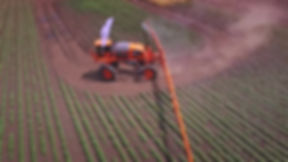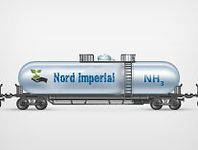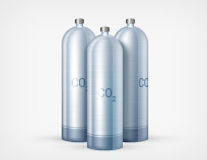
PRODUCTS

Beyond fertilizers, liquid ammonia is also used in refrigeration systems as a coolant, in the metal industry (to create protective atmospheres), and in the plastics industry.
Side Box
Needs label: perhaps “Ammonia increases crop yields”
+10% Wheat yield
+60% Corn yield

Ammonia
Ammonia (NH3) is a colorless gas with a pungent odor that is an important component in fertilizers for agriculture such as ammonium nitrate, urea and composite fertilizers. Comprised of a compound of nitrogen and hydrogen, applying just 100kg of ammonia to a hectare of soil will increase wheat yield by 8-10% and corn yield by 60%. Nord Imperial carries out extensive work in research and development in order to improve the application of fertilizers. An example of our dedication to constantly contine cultivating our methods include, but are not limited to, investing in a number of U.S. units, coordinating the production of alternatives, improving the applicationof fertilizers, such as liquid ammonia and ammonia water, which are used as a standalone fertilizers.
Carbonic acid
Carbonic acid has found an extensive application in the oil industry, in mechanical engineering, shipbuilding, automobile construction and medicine. The product is also widely used in the food industry in the productoin of sugar, carbonated beverages, cocktails and beer. In its solid form, carbon dioxide is called ‘dry ice’, a product in high demand in the food processing industry for its ability to significantly increase the storage life of meat, dairy products, fruit and vegetables.

Urea
Urea (CH4N2O) is a chemical compound often used as a highly concentrated nitrogen fertilizer. Also called carbamide, urea has a wide range of uses beyond fertilizers including: as an effective protein additive to animal fodder, as a component in the production of artificial resins, plastics, adhesives, packs and in the refining of petroleum products, as well as other uses in the wood, fabric, food, and pharmaceutical industries.
Nord Imperial maintains its competitive edge in the production of urea through its commitment to quality, an achievement confirmed by numerous awards. Our dedicated laboratory applies strict quality control to our urea products, including post-completion treatment with formaldehyde condensate to preserve quality during shipping to the final customer.


Basalt fiber and film
We began producing high-strength basalt fiber in order to serve our own need for a thermal insulation material that was better quality and more environmentally friendly than fiberglass, without sacrificing the crucial non-flamable property. We use our basalt fiber throughout our industrial facilities, and it is also commonly used to insulate residential and other buildings.
We also produce several different types of polyethylene film in the same workshop, primarily for corporate uses such as shrink film for packing bricks and maufacturing urea packing bags.

Urea Formaldehyde Concentrate
Urea Formaldehyde Concentrate (CH2-N-CO-N-CH2) is a major scientific achievement which Nord Imperial patented in 2004. Today, Nord Imperial produces this clear, viscous liquid in two grades: one designed for processing granular nitrogen fertilizers; the other used by our wholly-owned sister company, Sheksninsky wood panel plant, in the production of high quality resin.
During the all-Russian exhibition ChemExpo 2008, organized by the Russian Ministry of Industry, Science and Technology, Nord Imperial was awarded for its high quality products, including praise for its UFC (and methanol) production.

Ceramic Production
Given that high quality clay deposits lie, literally, right under our workers’ feet, it’s not surprising that the earliest construction materials produced in our area were bricks. We purchased our Brick Factory from the Spanish company Agema, which provided assistance in optimising the production of ceramic tiles and frit. Today, the 60 million bricks Nord Imperial produces each year are highly sought after, ranked amongst the Top 100 Goods in Russia, and covered by a 70 year guarantee.
We use a large part of the construction materials we produce for our own facilities, but we also supply many other major industrial, social and residential projects.

Refractory materials and frit
A refractory is a heat-resitant material that retains its strength at high temperatures and is often used for lining furnaces, reactors and other processing units. Our refractory materials workshop specializes in repairing ammonia and urea units and industrial ceramic furnaces with refractory componentry. The workshop was established in cooperation with Austrian firm Plibrico, which supplies raw materials to produce dry concentrate compounds and precast shaped products.
The workshop also manufactures frit, the most expensive component in glazed tile production. We make enough frit to satisfy not only our internal demands, but also to supply glazed tile production plants across the country.
-
Di-ammonium Phosphate (DAP)
-
AMMONIUM SULFATE
-
TSP
-
NPK 161616
-
AMMONIUM NITRATE
-
UREA
-
SUPERPHOSPHATE
-
SULPHOAMMOPHOS 20:20
-
BARLEY
-
NPK (NPK) 8:24:24
-
NPK (NPK) 16:16:16
-
NPK (NPK) 17: 0.1: 28
-
NPK (NPK) 21: 0.1: 21
-
NPK (NPK) 23: 13: 8
-
NPK (NPK) 14:14:23
-
POTASSIUM CHLORIDE
-
REFINED SUNFLOWER OIL
-
WHEAT FLOUR
-
CRUDE SUNFLOWER OIL
-
RAPESEED OIL
-
CRUDE DEGUMMED
-
RAPESEED OIL
-
CORN OIL
-
SOYBEAN OIL
-
VEGETABLE OIL
-
WHEAT
-
BUCKWHEAT
Ammonium nitrate
Quality characteristics Reagent grade
Purity (NH4NO3) on dry basis 98%
Nitrogen content, min. No standardized
Moisture content, max. 0.3%
pH (10% solution), min. 5.0
Insolubles (in 10% nitric acid solution), max. 0.2%
Mass content of additives Mg(NO3)2 in terms of MgO 0.3-0.4%
Granule static strength, min. 0.5 kg/granule
Particle size:
1-3 mm, min. 93%
under 1 mm, max. 4%
Friability 100%
Urea
Quality characteristics Reagent grade
Appearance White prills
Total nitrogen (N), min. 46.2%
Biuret, max. 1%
Moisture content, max. 0.3%
Granulometric composition:
under 1 mm, max. 3%
Granule static strength, min. 0.5 kg/granule
1-3 mm, min. 0.3%
1-4 mm, min. 94%
under 6 mm 100%
Granule static strength 0.7 kgF/granule
Ammonium nitrate (AN)
Quality characteristics Reagent grade
Appearance White prills
Total nitrogen (N), min. 34.4%
Moisture content, max. 0.3%
Granulometric composition:
under 1 mm, max. 3%
Granule static strength, min. 2 MPa
1-4 mm, min. 95%
under 6 mm 100%
Ammonium nitrate porous prilled (PPAN)
Quality characteristics Reagent grade
Purity (NH4NO3) on dry basis, min. 98%
Moisture content, max. 0.5%
pH (10% solution), min. 4.5%
Mass concentration of organic additive, max. 0.15%
Mass concentration of inflating agents in terms of MgO, max. 0.6%
Granule static strength, min. 0.3 kg/granulе
Oil absorption, min. 10%
Oil retention, min. 5.5%
Bulk density 0.72-0.80 g/cm3
Particle size (mm):
1-3 mm, min. 90%
less than 1 mm and more than 3, max. 10%
Note: Product is treated by anti-caking additives.
Calcium ammonium nitrate (CAN)
Quality characteristics Reagent grade
Appearance Greyish-white granules
Total nitrogen (N), max. 27%
of which
nitric N, max. 13.5%
ammoniacal N, max. 13.5%
Calcium carbonate, min. 20%
Calcium nitrate content, max. 1%
Moisture content, max. 1%
Granulometric composition:
under 1 mm, max. 1%
2-5 mm, min. 95%
under 6.3 mm 100%
Granule static strength, min. 3 MPa
Note: Product is treated by anti-caking additives.
Calcium ammonium nitrate with sulphur (CNS)
Quality characteristics Reagent grade
Appearance Greyish-white granules
Total nitrogen (N), max. 27%
of which
nitric N, max. 13.5%
ammoniacal N, max. 13.5%
Sulphur: S (SO3), min. 4% (10)%
Calcium on CaO basis, min. 6%
Calcium nitrate content, max. 1%
Moisture content, max. 1%
Granulometric composition:
under 1 mm, max. 1%
2-5 mm, min. 95%
under 6.3 mm 100%
Granule static strength, min. 2.5 MPa
Note: Product is treated by anti-caking additives.
Calcium ammonium nitrate with sulphur (CNS)
Quality characteristics Reagent grade
Appearance white granules
Calcium nitrate, min 96%
Moisture content, max 3%
Ammoniacal Nitrogen 0.3%
Insolubles, max 0.1%
Granulometric composition:
under 1 mm, max. 10%
1 - 4 mm, min 90%
Under 6 mm 100%
Calcium nitrate anhydrous
Quality characteristics Reagent grade
Appearance white granules
Calcium nitrate, min 96%
Moisture content, max 3%
Ammoniacal Nitrogen 0.3%
Insolubles, max 0.1%
Granulometric composition:
under 1 mm, max. 10%
1 - 4 mm, min 90%
Under 6 mm 100%
Calcium nitrate concentrated
Quality characteristics Reagent grade
Appearance white granules
Total nitrogen (N) min 17%
Nitric nitrogen 16.7%
Ammoniacal Nitrogen 0.3%
Calcium on CaO basis,min 33%
Moisture content, max 3%
Insolubles, max 0.1%
pH (1% solution) 5.5-6.5
Condensed anhydrous ammonia
Quality characteristics Reagent grade
Appearance Colorless liquid
Ammonia content, min. 99.6%
Nitrogen content, min. 82%
Water content (drying method) 0.2-0.4%
Iron (Fe) content, max. 1 mg/l
Oil content, max. 2 mg/l
Chlorine content, max. 0.5 mg/kg
Carbon dioxide content, max. 40 mg/kg
Technical monoammonium phosphate (MAP)
Quality characteristics Reagent grade
Appearance white crystals
Monoammonium phosphate, min 99%
Moisture content, max 0.3%
Insolubles, max 0.1%
Bulk density 0.95-1 mt/m3
MAP NP 12:52
Quality characteristics Reagent grade
Appearance Greyish granules
Total phosphorus pentoxide (P2O5) 52±1%
P2O5 available 97±1% of the total P2O5
Total nitrogen (N) 12±1%
Moisture content, max. 1.7%
Granulometric composition:
under 1 mm, max. 3%
2-5 mm, min. 95%
under 6 mm 100%
Granule static strength, min. 3 MPa
Note: Product is treated by anti-caking additives.
Monoammonium Phosphate NP 12:61
Quality characteristics Reagent grade
Appearance White crystals
Nitrogen (ammoniacal form) 12±0.3%
Water-soluble phosphates P2O5 61±0.5%
Moisture content, max 0.3%
Insolubles, max 0,1%
pH (1% solution) 4.5
Solubility (in water at 25 °C) 37.1 g/100 cm3
Bulk density 0.95-1 mt/m3
NPK 10:26:26
Quality characteristics Reagent grade
Appearance Grey-pink granules
Total nutrient content, min. 60%
Total nitrogen (N) 10±1%
of which
ammoniacal N 10±1%
nitric N none
Phosphorus pentoxide (P2O5):
availableP2O5 26±1%
water-soluble P2O5, min. 18%
Water-soluble potassium oxide (K2O) 26±1%
Moisture content, max. 1%
Granulometric composition:
under 1 mm, max. 1%
2-5 mm, min. 90%
under 6 mm 100%
Granule static strength, min. 3 MPa
Note: Product is treated by anti-caking additives.
NPK 24:6:12
Quality characteristics Reagent grade
Appearance Granules of greyish-pink to light brown color
Total nutrient content, min. 39%
Total nitrogen (N) 24±1%
Phosphorus pentoxide (P2O5):
P2O5 available, 6±1%
P2O5 water-soluble, min. 3%
Water-soluble potassium oxide (K2O) 12±1% Moisture content, max. 1%
Granulometric composition:
under 1 mm, max. 1%
2-5 mm, min. 95%
under 6,3 mm 100%
Granule static strength, min. 3 MPa
Note: Product is treated by anti-caking additives.
NPKS 8:20:30:2
Quality characteristics Reagent grade
Appearance Granules of greyish-pink to light brown color
Total nutrient content, min. 55%
Total nitrogen (N) 8±1%
Phosphorus pentoxide (P2O5):
P2O5 available, 20±1%
P2O5 water-soluble, min. 15%
Water-soluble potassium oxide (K2O) 30±1%
Sulphur S, min. 2%
Moisture content, max. 1,2%
Granulometric composition:
under 1 mm, max. 3%
2-5 mm, min. 90%
under 6,3 mm 100%
Granule static strength, min. 3 MPa
Note: Product is treated by anti-caking additives.
NPKS 22:7:12:2
Quality characteristics Reagent grade
Appearance Granules of greyish-pink to light brown color
Total nutrient content, min. 41%
Total nitrogen (N) 22±1%
of which
ammoniacal N, min. 12%
nitric N, max. 10%
Phosphorus pentoxide (P2O5):
P2O5 available, 7±1%
P2O5 water-soluble, min. 3%
Water-soluble potassium oxide (K2O) 12±1%
Sulphur S, min. 2% (5%)
Moisture content, max. 1%
Granulometric composition:
under 1 mm, max. 3%
2-5 mm, min. 95%
under 6,3 mm 100%
Granule static strength, min. 3 MPa
Note: Product is treated by anti-caking additives.
NPKS 27:6:6:2
Quality characteristics Reagent grade
Appearance Granules of greyish-pink to light brown color
Total nutrient content, min. 38%
Total nitrogen (N) 27%
Phosphorus pentoxide (P2O5):
P2O5 available, 6%
P2O5 water-soluble, min. 2%
Potassium oxide (K2O):
water-soluble К2О, min. 6%
Sulphur S, min. 2% (5%)
Moisture content, max. 1%
Granulometric composition:
under 1 mm, max. 3%
2-5 mm, min. 95%
under 6,3 mm 100%
Granule static strength, min. 3 MPa
Note: Product is treated by anti-caking additives.
NPKS 21:10:10:2
Quality characteristics Reagent grade
Appearance Granules of greyish-pink to light brown color
Total nutrient content, min. 41%
Total nitrogen (N) 21±1%
of which
ammoniacal N, min. 11%
nitric N, max. 10%
Phosphorus pentoxide (P2O5):
P2O5 available, 10±1%
P2O5 water-soluble, min. 4%
Water-soluble potassium oxide (K2O) 10±1%
Sulphur S, min. 2% (5%)
Moisture content, max. 1%
Granulometric composition:
under 1 mm, max. 3%
2-5 mm, min. 95%
under 6,3 mm 100%
Granule static strength, min. 3 MPa
Note: Product is treated by anti-caking additives.
NS 30:7
Quality characteristics Reagent grade
Appearance White to light grey-yellowish granules
Total nitrogen (N) 30±1%
of which
ammoniacal N, min. 18%
nitric N, max. 12%
Water-soluble sulphur, S (SO3), min. 7% (17.5%)
Moisture content, max. 1%
Granulometric composition:
under 1 mm, max. 3%
2-5 mm, min. 95%
under 6,3 mm 100%
Granule static strength, min. 3 MPa
Note: Product is treated by anti-caking additives.
Potassium nitrate
Quality characteristics Reagent grade
Appearance white crystal
Potassium nitrate (KNO3), min 99.90%
Moisture content, max. 0.20%
Chlorides in terms of NaCl, max 0.017%
Insolubles, max 0.01%
Potassium permanganate oxidizable substances
in terms of KNO2, max 0.01%
Calcium and magnesium salts
in terms of Ca, max 0.002%
Iron, max 0.005%
Potassium nitrate NK 13.7-46.2
Quality characteristics Reagent grade
Appearance White crystals, yellowish-grey shade
KNO3 content: on dry basis, min 99.9%
in terms of nitrogen, min 13.7%
in terms of potassium (K/K2O), min 38,2/46.2%
Moisture content, max 0.2%
Chlorine salt content, max 0.02%
Insoluble, max 0.01%
pH (1% solution) 5.4
Sodium nitrate
Quality characteristics Reagent grade
Appearance White crystals
Sodium nitrate (NaNO3), min 99.5%
Chlorides in terms of NaCl, max 0.3%
Oxidizable compounds in terms of NaNO2, %, max 0.2%
Moisture content, max 0.5%
Chlorine salt content, max 0.02%
Insoluble, max 0.03%
Note: The product absorbs moisture from the air. As a result of this it can very rapidly cake and thus harden under adverse conditions.
Sodium nitrite
Quality characteristics Reagent grade
Appearance White crystals
Sodium nitrite (NaNO2), min 98.5%
Sodium nitrate (NaNO3), max 1%
Chlorides in terms of NaCl, max 0.17%
Insolubles, max 0.03%
Moisture content, max 1.4%
Stabilized ammonium nitrate (SAN)
Quality characteristics Reagent grade
Appearance White prills
Total nitrogen (N) 33±1%
Phosphorus pentoxide (P2O5) available, min. 3%
Moisture content, max 0.3%
Granulometric composition:
under 1 mm, max. 3%
1-4 mm, min. 95%
under 6 mm 100%
Granule static strength, min. 3 MPa
Note: Product is treated by anti-caking additives.
Technical urea
Quality characteristics Reagent grade
Nitrogen content on dry basis, min. 46.3%
Biuret, max. 0.6%
Free ammonia, max. 0.02%
Moisture content, max
Drying method 0.3%
Fischer assay 0.6%
Granulometric composition:
under 1 mm, max. 3%
1-4 mm, min. 94%
2-4 mm, min. 70%
Bulk density 0.70-0.78 g/cm3
NPK water-soluble STARTER
QUALITY CHARACTERISTICS 15:30:15 +2MgO +TE 15:31:15 +TE 11:40:11 +2MgO +TE 13:40:13 +TE
Total nitrogen (N) 15% 15% 11% 13%
of which
Nitric nitrogen 4,4% 6,5% 3% 4,5%
Ammoniacal nitrogen 6% 8,5% 8% 8,5%
Ureic nitrogen 4,6% - - -
Water-soluble phosphates as P2O 530% 31% 40% 40%
Potassium (K2O) 15% 15% 11% 13%
Magnesium as MgO 2% - 2% -
NPK water-soluble UNIVERSAL
QUALITY CHARACTERISTICS 18:18:18 +3MgO +TE 19:19:19 +TE 20:20:20 +TE
Total nitrogen (N) 18% 19% 20%
of which
Nitric nitrogen 5,4% 10,5% 6%
Ammoniacal nitrogen 3,6% 8,5% 4%
Ureic nitrogen 9% - 10%
Water-soluble phosphates as P2O5 18% 19% 20%
Potassium (K2O) 18% 19% 20%
Magnesium as MgO 3% - -
NPK water-soluble FINISHER
QUALITY CHARACTERISTICS 14:7:30 +3MgO +TE 15:7:30 +3MgO+TE 12:6:36 +2,5MgO+TE
Total nitrogen (N) 14% 15% 12%
of which
Nitric nitrogen 10,7% 8,7% 10,6%
Ammoniacal nitrogen 3,3% 1,4% 1,4%
Ureic nitrogen - 4,9% -
Water-soluble phosphates as P2O5 7% 7% 6%
Potassium (K2O) 30% 30% 36%
Magnesium as MgO 3% 3% 2,5%
NPK 24:6:12
Quality characteristics Reagent grade
Appearance Granules of greyish-pink to light brown color
Total nutrient content, min. 39%
Total nitrogen (N) 24±1%
Phosphorus pentoxide (P2O5):
P2O5 available, 6±1%
P2O5 water-soluble, min. 3%
Water-soluble potassium oxide (K2O) 12±1% Moisture content, max. 1%
Granulometric composition:
under 1 mm, max. 1%
2-5 mm, min. 95%
under 6,3 mm 100%
Granule static strength, min. 3 MPa
Note: Product is treated by anti-caking additives.
